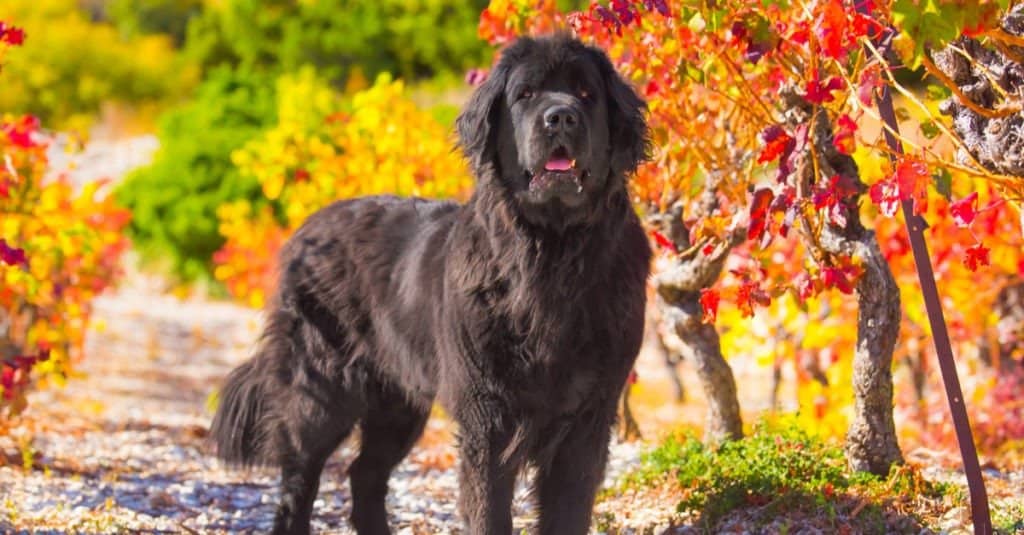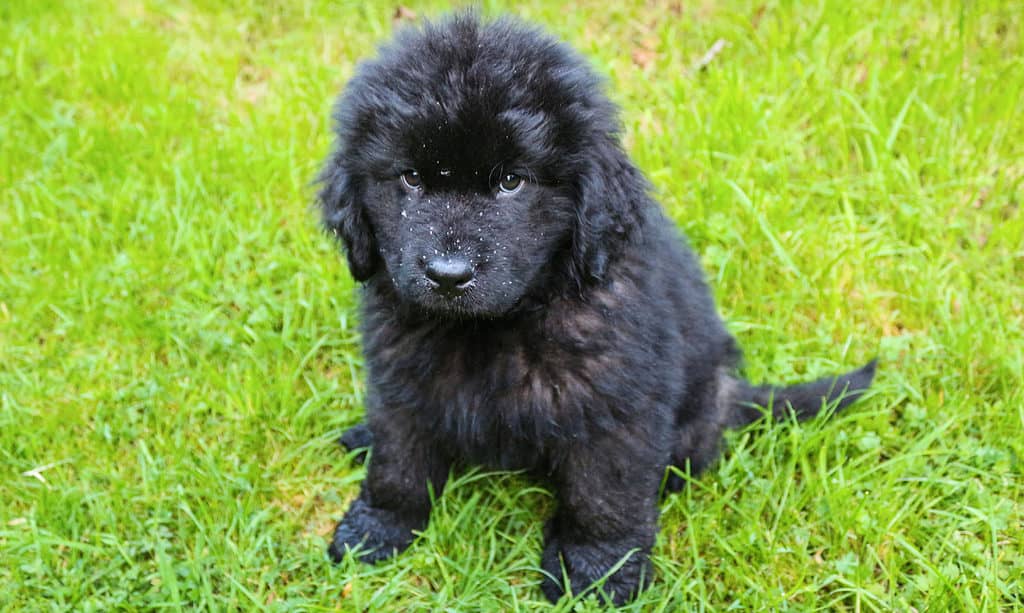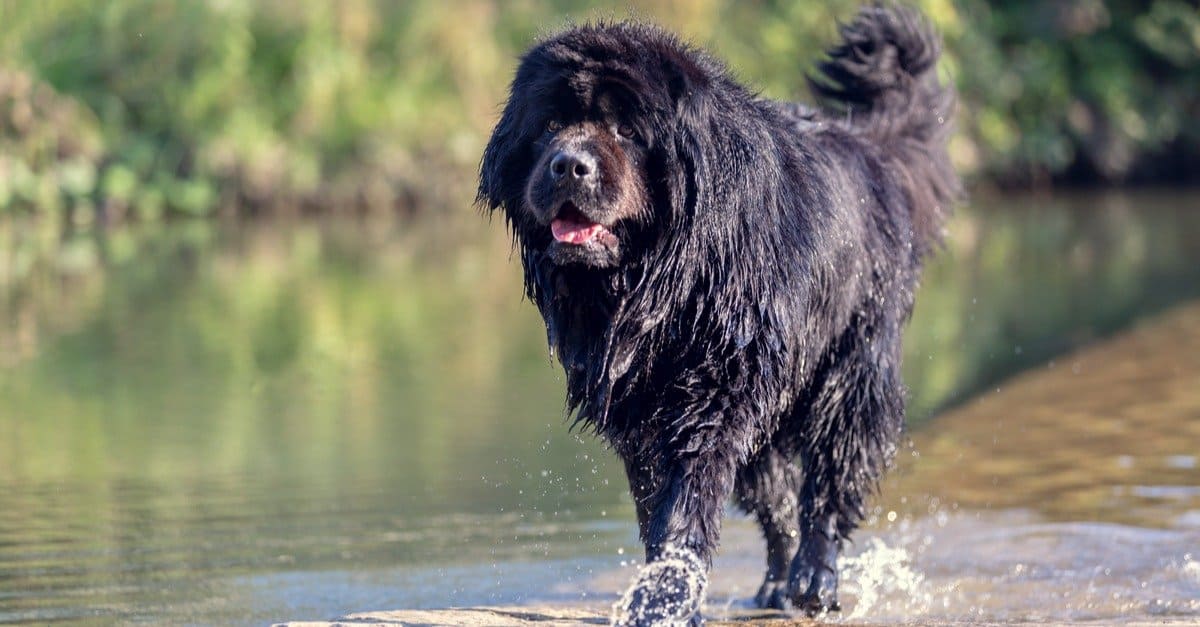Most dogs are pregnant for approximately nine weeks or between 2 to 3 months. However, in the first month of a dog’s pregnancy, you might not even notice that they are pregnant. It will become more apparent in the second month. The gestation period, as it is called, will range between 57 – 65 days, with an average of 63 days depending on breed and conditions. Therefore, a Newfoundland pregnancy can be expected to be around nine weeks. There are many different things to look out for each week, and these massive dogs will need extra special care when pregnant.
Newfoundland’s Summary
These enormous dogs are part of the Mastiff family and are direct descendants of the extinct St. John’s water dog. Furthermore, they were bred to assist Canadian fishermen in hauling fishing nets onto boats in the North Atlantic Sea. Also, they will not hesitate to jump into the water to rescue someone who has fallen overboard because they are very good swimmers and are, to this day, used in water rescue. Newfoundlands are known for their huge size, with males weighing between 140 to 180 pounds and females weighing between 120 to 125 pounds.
Newfies, as they are affectionately known, are made for swimming with their webbed feet and strong, muscular bodies. In addition, they have thick, woolly coats which are water-resistant. Their coloring can be brown, black, grey, or a combination of white and black. Unfortunately, they do shed a lot, and their hair can mat, so they need a lot of grooming. However, they are intelligent, sweet-natured, social, and loving dogs, making wonderful family companions as they are great with children. They are not high-energy dogs and can be lazy sometimes, but they must be stimulated with physical activity.

Newfoundlands are known for their huge size, with males weighing between 140 to 180 pounds and females weighing between 120 to 125 pounds.
©Pandas/Shutterstock.com
Pregnancy Symptoms
A Newfoundland, like any other dog, will exhibit a wide variety of symptoms during their pregnancy, such as:
- Decreased activity
- Enlarged abdomen
- Increased appetite
- Weight gain
- Unusual behavior
- Nesting behavior
- Enlarged or discolored nipples
Gestation Period: How Long Are Newfoundland’s Pregnant?
A Newfoundland pregnancy is approximately 63 days from conception. However, it can vary by several days. When dealing with planned breeding, it is best to take note of the exact date when mating occurred.
Pregnancy Care for Newfoundland’s
As with other dog breeds, when a Newfoundland is pregnant, there are certain steps to take care of them. Proper nutrition is a must. Therefore, the mom should receive good quality food and should be at a healthy weight. However, her diet does not have to be changed in the first two-thirds of the pregnancy as increasing her food could be harmful. Only in the last few weeks of gestation should food portions be increased gradually. Also, smaller meals more frequently are ideal as big meals may cause discomfort.
Exercise is also very important in a Newfoundland pregnancy. Some vets believe normal exercise is fine during the first few weeks of pregnancy. However, shorter, more frequent walks are better towards the end of the pregnancy. Regular visits to a vet will help the dog stay healthy during her pregnancy. A vet can confirm the pregnancy and advise on what to do and expect. In addition, a vet can tell you if your Newfoundland will be able to have a normal birth or if a cesarean may be necessary.
Average Litter Size for Newfoundland’s
The average litter size of a Newfoundland is about 8 – 10 puppies, but there may be as little as two or as many as 15. These puppies should drink their mother’s milk for at least the first month of their lives. They can then start on a milk replacer and high-quality dry food. By the time they are eight weeks old, they can eat dry food.
What to Expect in Week 1
In week one, several eggs are fertilized high up in the uterus and slowly migrate to the uterine horns. In addition, the mom will experience some hormonal changes even though there will not be any physical changes yet. At this stage, owners should carry on as normal, feeding and playing with their dogs.
What to Expect in Week 2
Week two’s goal is for the mom to maintain her weight. Her energy levels should be the same as before she was pregnant, and grooming can continue normally. Dogs are not advised to gain more than 10% of their weight during pregnancy. At this stage, changes to her diet or supplements are not needed yet, unless stipulated by a vet.
What to Expect in Week 3
In week three, there are still no visible changes in the mom. However, the puppies in the womb are protected in a membrane layer that offers them the necessary nutrients. Also, there is still no need to alter the mom’s daily routine and the amount of food she eats.
What to Expect in Week 4
Week four is when visiting a vet for a check-up will become necessary. The vet can do an ultrasound to determine the puppies’ health and litter size and give an accurate birthing date. In addition, the vet will be able to see if there are any problems or abnormalities and advise how to deal with them.
What to Expect in Week 5
In week five, the embryogenesis stage has ended, and the puppy’s organs are beginning to form. The embryos are called fetuses during this stage of Newfoundland’s pregnancy. Additionally, in week five, the mom will start to put on a lot of weight. It is advisable to begin feeding the mom more at this stage, but a vet can advise on quantity, portion sizes, and frequency.
What to Expect in Week 6
Week six is when the puppies develop more distinct organs, cells, and claws. Mom should be given a higher-energy diet with more proteins and minerals. However, she may have a diminished appetite due to the discomfort of the pregnancy. Also, she should eat smaller, more frequent meals instead of 2 big meals a day.
What to Expect in Week 7
The puppies will start developing hair in week seven, and their skeletons will begin solidifying. These are some of the last features to develop. However, at this stage, parasites are a concern. Therefore, the mom must be up to date with her vaccinations and deworming.
What to Expect in Week 8
Week eight should be around day 50. The vet might decide to perform an x-ray to check the puppies and decide on a final birthing plan. However, not all vets will choose to do an X-ray. At this stage, some milk might come from the mom’s teats. This normally occurs about a week before giving birth.
What to Expect in Week 9
In the last week, the mom might start nesting, looking for a quiet, warm place to give birth. The owners should provide a site that is warm and has blankets, and is comfortable. Also, the mom should be prepared for delivery, her teats and rear end should be cleaned, and if there is a lot of hair in those areas, it must be cut, providing the puppies with a hygienic birth.
How to Prepare for Labor and Delivery
There are a few things that can be done to make labor and delivery as smooth as possible with a Newfoundland pregnancy, including:
- Setting up a quiet, clean delivery area.
- Have a tin of puppy milk on hand, just in case.
- Extra clean towels and linens nearby the birthing area.
- Have disposable gloves on hand.
- Have extra kitchen towels close by.
- Have a scale to weigh the puppies when they are born.
- Have your vet’s phone number on hand in case of an emergency.
How to Care For Your Newfoundland Afterward
After the puppies are born, the mother should clean them straight away. She will remove the sack and lick them clean. Then, they must start nursing within an hour or three after birth. An owner should not remove the placenta immediately, as the mom might want to eat it to regain all the nutrients she put into her pregnancy. Additionally, the birthing area must be kept warm, as puppies cannot regulate their body temperature yet.
Owners must take the mom and puppies to the vet to check if everyone is healthy. Also, other dogs should be kept away from the puppies for the first few days. The mom must not be washed for a few weeks after birth, if possible. While the mom is breastfeeding, feeding her high-quality puppy food is advisable. However, owners must not give moms additional calcium, which could cause later milk fever. Lastly, the mom’s hair around her teats must be kept clean and cut, and the owner should check her mammary glands for infection daily.

The birthing area must be kept warm, as puppies cannot regulate their body temperature yet.
©LigaP/Shutterstock.com
Ready to discover the top 10 cutest dog breeds in the entire world?
How about the fastest dogs, the largest dogs and those that are -- quite frankly -- just the kindest dogs on the planet? Each day, AZ Animals sends out lists just like this to our thousands of email subscribers. And the best part? It's FREE. Join today by entering your email below.
Thank you for reading! Have some feedback for us? Contact the AZ Animals editorial team.








